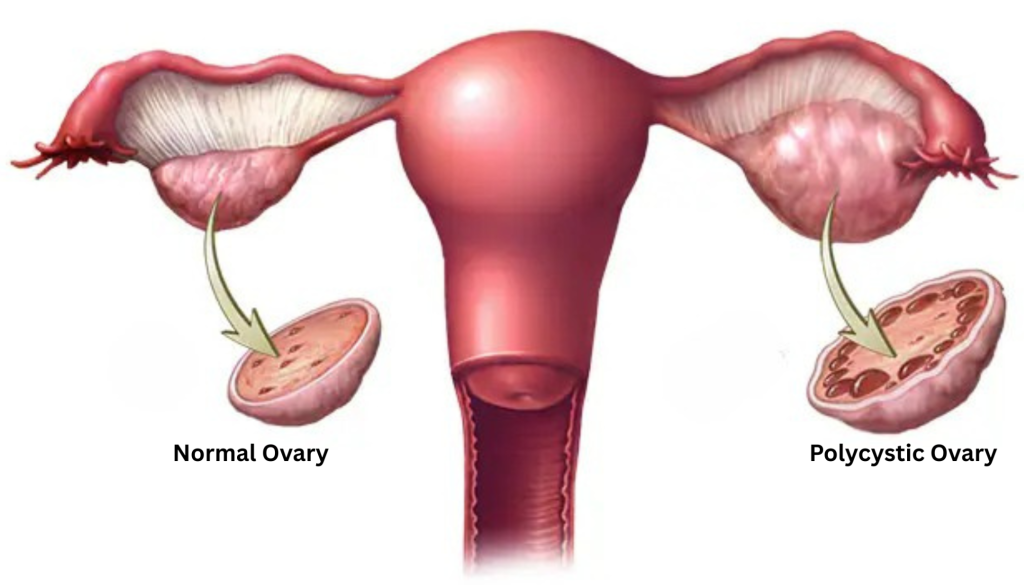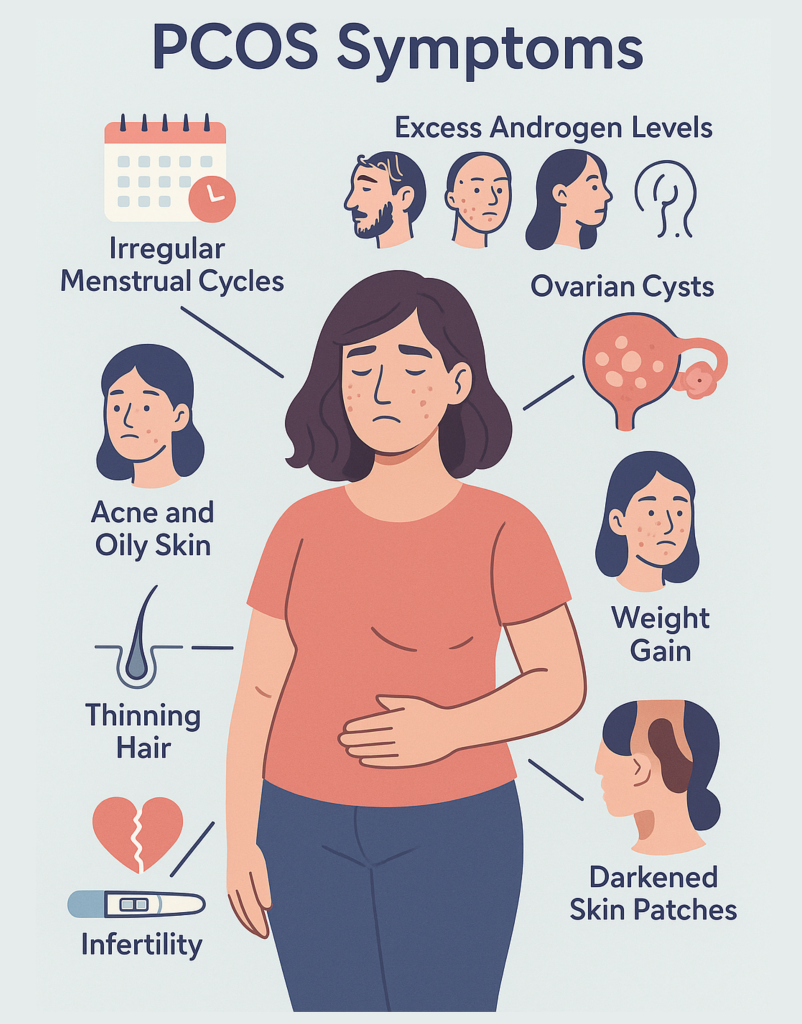Understanding PCOS: Symptoms, Diagnosis & Treatment
Polycystic Ovary Syndrome (PCOS) is a common hormonal disorder that affects up to 10% of women globally, especially during their reproductive years. Women with PCOS may experience symptoms like irregular periods, excessive hair growth, acne and infertility. Though PCOS is not curable, it is manageable with the best fertility treatments available, such as hormonal therapies, fertility medications and advanced infertility care.
At Lakshmi Fertility Centre, located in Karaikudi, we specialize in offering comprehensive fertility treatments, including IVF, IUI and ICSI, tailored to your unique needs. This article will explore the best treatment options for managing PCOS, addressing fertility concerns and improving your chances of conception.

What is PCOS?
PCOS is a condition where the ovaries produce higher-than-normal levels of male hormones, leading to hormonal imbalances. This affects the regularity of ovulation, making it more challenging for women to conceive.
Symptoms of PCOS

PCOS presents a range of symptoms, varying in severity. Common signs include:
- Irregular Menstrual Cycles : Women with PCOS often experience infrequent or prolonged menstrual periods, which can hinder ovulation tracking.
- Excess Androgen Levels: Elevated levels of male hormones (androgens) can lead to physical signs such as excess facial and body hair (hirsutism), severe acne, and male-pattern baldness.
- Ovarian Cysts: PCOS may cause the ovaries to develop numerous small collections of fluid (follicles) and fail to regularly release eggs.
- Acne and Oily Skin: Hormonal imbalances in PCOS can result in increased oil production, leading to persistent acne.
- Weight Gain and Insulin Resistance: Many women with PCOS experience weight gain, particularly around the abdomen, due to insulin resistance.
- Infertility: PCOS is a common cause of infertility, as it can interfere with the regular release of eggs necessary for conception.
- Thinning Hair: Hair thinning or hair loss on the scalp, known as androgenic alopecia, is another symptom associated with PCOS.
- Darkening of the Skin (Acanthosis Nigricans): Some women with PCOS develop dark, velvety patches of skin in body creases such as the neck, groin, or under the breasts.
PCOS and its symptoms can significantly impact a woman’s self-esteem and emotional well-being, especially in the context of infertility. Treatment is essential not only for reproductive health but also to support emotional health and overall quality of life. According to studies, women with PCOS may also experience higher risks of diabetes and endometrial cancer if left untreated, making management crucial. To understand more about PCOS, explore the Mayo Clinic’s article on the subject: Polycystic Ovary Syndrome (PCOS).
How is PCOS Diagnosed?
The diagnosis of PCOS involves several key steps:
- Medical History: Doctors assess menstrual cycle patterns and symptom history.
- Blood Tests: Hormone levels, including testosterone and insulin, are measured.
- Ultrasound: A pelvic ultrasound is used to check for cysts on the ovaries.
At Lakshmi Fertility Centre, we provide a comprehensive diagnostic approach, ensuring an accurate diagnosis and the best treatment plan for each individual.
PCOS Treatment Options at Lakshmi Fertility Centre
Lifestyle Modifications
A balanced diet, regular exercise and weight management are essential for managing PCOS. Studies have shown that losing 5-10% of body weight can significantly improve menstrual cycle regulation and increase fertility. According to WebMD, even a small weight loss can have a major impact on symptom improvement.
For many women, maintaining a healthy lifestyle can help regulate insulin resistance, which is often associated with PCOS. This can reduce the severity of symptoms and enhance the effectiveness of fertility treatments.
Hormonal Treatments
Medications like birth control pills, progestins and anti-androgens are commonly prescribed to balance hormones, regulate periods and treat excess hair growth. Oral contraceptives are used to control irregular periods and manage skin conditions like acne. These treatments improve both the symptoms and quality of life for women with PCOS.
Fertility Treatments
For women with PCOS-related infertility, treatments like IUI (Intrauterine Insemination), IVF (In Vitro Fertilization) and ICSI (Intracytoplasmic Sperm Injection) are common options. These procedures are designed to increase pregnancy chances, especially for women who struggle with irregular ovulation.
- IUI: A method where sperm is directly placed in the uterus to increase the chances of conception.
- IVF: Eggs are fertilized outside the body and the embryo is implanted into the uterus.
- ICSI: A form of IVF where a single sperm is injected into an egg.
According to the American Society for Reproductive Medicine, success rates for IVF in women with PCOS range between 40-50% per cycle (ASRM – IVF Success Rates).
In cases of male infertility or when IUI does not work, ICSI can be an effective alternative, ensuring that the fertilization process has the highest chances of success.
Ovulation-Stimulating Medications
Clomiphene Citrate (Clomid) and Letrozole are medications that stimulate ovulation in women with PCOS. These medications induce ovulation, increasing the chances of getting pregnant naturally.
Metformin
Metformin is used to treat insulin resistance, a common issue for women with PCOS. It helps regulate periods and promotes ovulation, improving fertility and decreasing the risk of gestational diabetes.
Recent studies have also found that Metformin, when combined with Clomiphene Citrate, can significantly enhance ovulation and improve the chances of pregnancy in women with PCOS.
Surgical Treatment: Ovarian Drilling
In cases where other treatments have not worked, ovarian drilling may be considered. This procedure involves minimally invasive surgery to reduce excessive androgen production, improving ovulation and fertility. It is typically performed in women who have not responded to oral medications.
Psychological Impact of PCOS
PCOS can have a significant psychological impact, with many women experiencing anxiety, depression and lower self-esteem due to symptoms like excess hair growth, acne and infertility. Coping with these emotional challenges is crucial for maintaining overall well-being. Seeking support from a fertility counselor or a support group can help manage the psychological effects of PCOS.
Global Research on PCOS and Treatment Success
Research has shown that PCOS affects women across all races and ethnicities. A study by the National Institutes of Health (NIH) highlighted that 70-80% of women with PCOS experience infertility. However, they can still achieve successful pregnancies with appropriate treatments like lifestyle changes, insulin-sensitizing medications and fertility treatments. The American Pregnancy Association offers a detailed guide to understanding the fertility challenges of PCOS: PCOS and Fertility.
FAQs
1. Can PCOS be completely cured?
No, but symptoms can be effectively managed through a combination of lifestyle changes, medications and advanced fertility treatments.
2. What is the best treatment for PCOS?
The best treatment varies for each woman. Options include lifestyle modifications, hormonal therapies and fertility treatments like IVF.
3. Can I get pregnant with PCOS?
Yes, many women with PCOS can conceive with the right fertility treatments like ovulation induction or IVF.
4. How effective is IVF for women with PCOS?
IVF has a 40-50% success rate for women with PCOS, depending on age and other factors.
Conclusion
While PCOS cannot be completely cured, it can be successfully managed with the right treatments. Whether through medications, lifestyle changes or advanced fertility treatments like IVF, there are numerous options available to help women with PCOS achieve their fertility goals. At Lakshmi Fertility Centre, we are dedicated to providing advanced infertility care and supporting women with PCOS on their journey to parenthood.
Take charge of your fertility journey today – book your personalized consultation at Lakshmi Fertility Centre and explore treatment options tailored just for you.
